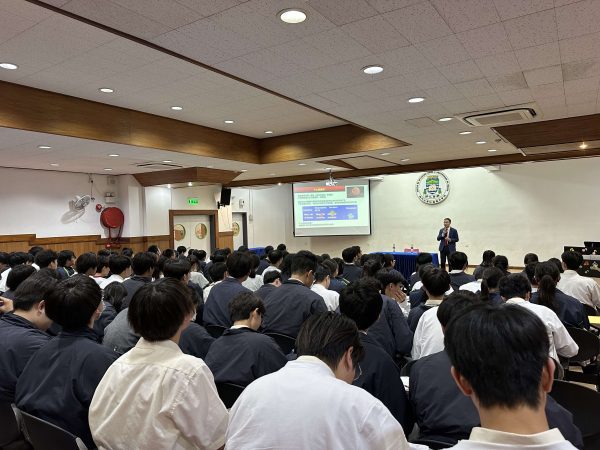News Express: UM FHS gives talks on cancer research and internet addiction at secondary schools
新聞快訊:澳大健康科學學院走進中學 分享癌症與網絡依賴問題

澳大健康科學學院為中學生舉辦科學講座
UM FHS holds science talks for secondary school students
澳大健康科學學院走進中學 分享癌症與網絡依賴問題
澳門大學健康科學學院走進澳門大學附屬應用學校及利瑪竇中學,為600多名中學生主講兩專題講座,內容涵蓋癌症知識及年輕人互聯網依賴問題,幫助青少年深入了解相關健康挑戰,並通過專業講解和生動案例引導他們樹立正確的健康觀念和數位生活態度。
首場講座題為“癌症:我們知多少?我們該怎麼做?”,由澳大健康科學學院院長鄧初夏主講。鄧初夏以深入淺出的講解方式,向學生介紹了癌症的基本知識,探討了腫瘤形成的複雜因素,包括先天性基因突變、後天環境影響、表觀遺傳學變化等。他特別提到,傳統腫瘤治療往往採取“一刀切”式的通用方案,這種方法對部分患者有效,但不能滿足所有患者的個體化需求。為此,學院致力推動癌症個體化治療的研究,即根據每位患者的基因特點和腫瘤特性,制定針對性的治療策略。鄧初夏表示,該項研究方向是學院的重點發展領域之一,旨在提高治療效果和患者生活質素。他亦介紹了學院在癌症藥敏試驗方面的最新進展,強調其在精準醫療中的重要意義。
第二場講座由澳大健康科學學院公共衛生和醫藥管理系系主任、特聘教授項玉濤主講,題為“年輕人中的互聯網依賴:這是個嚴重的健康問題嗎?”。項玉濤系統地分析網絡依賴的不同表現和類型,深入探討其對身心健康的多方面危害,並提出具體有效的應對策略。在講座中,他特別分享了一套網絡依賴量表,幫助學生了解自身的網絡使用情況,從而及時發現可能存在的問題。項玉濤指出,網絡依賴症目前未能通過藥物治療痊癒,但患者可以通過認知療法和行為干預來逐步康復。他強調,無論網絡能為人類帶來多少樂趣,它只是一個工具,應該由人來掌控,而不是被其控制。
在問答環節,學生踴躍提問,氣氛熱烈。鄧初夏回答學生問題時表示,科研之路雖然充滿挑戰,但最重要的是養成探索世界的好奇心並熱衷於追求知識。他強調,好奇心是推動科學研究的核心動力,而對研究的熱愛則能讓人擁有持久的內在動力,能夠克服各種困難。他又指,科研過程中難免會遭遇失敗,但這些“失敗”並不應該令人氣餒;事實上,很多研究突破都是在前人失敗的基礎上取得的。他鼓勵學生珍視每個科研機會,無論面對何種挑戰,都要堅定信念、堅持不懈,因為科學探索正是在不斷試錯中前進。項玉濤則鼓勵學生走出虛擬世界,將更多時間和精力投入到現實生活的人際交流中,這才是真正快樂與滿足的來源。
兩場講座內容豐富、深入淺出,既有專業知識的講解,也有生動有趣的案例分析,為學生提供了寶貴的科學知識,激發其對癌症研究和治療的興趣與熱情,也引發其對網絡使用行為的深思。
欲瀏覽官網版可登入以下連結:
https://www.um.edu.mo/zh-hant/news-and-press-releases/press-release/detail/61008/
UM FHS gives talks on cancer research and internet addiction at secondary schools
The Faculty of Health Sciences (FHS) of the University of Macau (UM) organised two science talks at the Affiliated School of the University of Macau and Colégio Mateus Ricci. Attended by over 600 secondary school students, the two talks focused on health topics including cancer and internet addiction among young people. The aim was to deepen students’ understanding of the health challenges related to these issues. Through expert explanations and engaging examples, the speakers encouraged students to develop healthier attitudes towards their well-being and their digital lives.
The first talk, titled ‘Cancer: How much do we know? What should we do?’ was delivered by FHS Dean Chuxia Deng. Using a clear and accessible approach, Prof Deng provided students with basic knowledge about cancer and explained the complex factors behind tumour formation, including congenital genetic mutations, environmental influences, and epigenetic changes. He noted that traditional cancer treatments often follow a one-size-fits-all approach, which, while effective for some patients, may not address the needs of every individual. To address this, FHS is committed to advancing research in personalised cancer treatment, which involves developing targeted therapies based on a patient’s genetic profile and tumour characteristics. Prof Deng emphasised that this research direction is a key area of development for FHS. It aims to improve treatment outcomes and enhance patients’ quality of life. He also gave an overview of FHS’s latest advancements in cancer drug sensitivity testing, highlighting its important role in precision medicine.
The second lecture, titled ‘Internet addiction among young people: Is it a serious health issue?’ was delivered by Xiang Yutao, Distinguished Professor and head of the Department of Public Health and Medicinal Administration in FHS. Prof Xiang systematically explained different types and symptoms of internet addiction, discussed its impact on both physical and mental health, and shared effective strategies to address this issue. In particular, he introduced an internet addiction scale to help students evaluate their online habits and identify potential problems. Prof Xiang noted that while there is currently no medication available to treat internet addiction, recovery can be achieved through cognitive therapy and behavioural interventions. He emphasised that while the internet provides entertainment, it should be viewed as a tool controlled by its users, not the other way around.
During the Q&A session, students actively asked questions. In his responses, Prof Deng emphasised the importance of cultivating curiosity about the world and a passion for knowledge, despite the challenges of scientific research. He explained that curiosity is the core driving force behind scientific discovery, while a passion for research provides the enduring motivation needed to overcome difficulties. Prof Deng also acknowledged that failure is an inevitable part of the research process but should not be a source of discouragement. Instead, he pointed out that many research breakthroughs are built upon past failures. He encouraged students to cherish every research opportunity and stay perseverant when facing challenges, as progress in science often comes through trial and error. Prof Xiang also offered valuable advice. He encouraged students to step away from the virtual world and dedicate more time to building real-life connections, which he described as the true source of happiness. By delivering engaging and informative content, the two talks deepened students’ scientific knowledge, stimulated their interest in cancer research and treatment, and prompted them to reflect on their online habits.
To read the news on UM’s official website, please visit the following link:
https://www.um.edu.mo/news-and-press-releases/press-release/detail/61008/